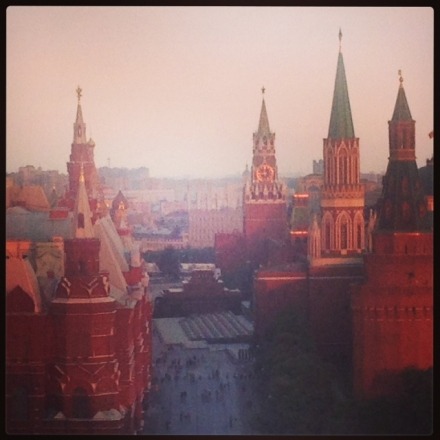Elizabeth Buchanan researched the Russian arctic strategy in Moscow

"A PhD on the geopolitics of Russian Arctic strategy meant fieldwork was always going to be challenging. Certainly, recent tensions on the Crimean Peninsula made for a fascinating time to be based in Moscow. En route to Russia I spent a short period conducting fieldwork in London where I was working from The Royal Institute of International Affairs. This allowed for unparalleled access to Russian archives and some of the fields leading experts. Given the nature of the Institute I was able to discuss my research with a range of academics working across the intersecting fields of energy security and climate change; strategic and defence studies as well as Russian and East European affairs – all relevant dimensions of my research. Furthermore, London is a central hub for an array of EU energy advisors as well as oil and gas majors all with keen interest in Arctic offshore developments. Meetings with key individuals not only served to inform my research objectives, but also allowed me to expand my industry contact base, aiding my professional development.
 Jetting over the Ukrainian crisis I arrived in Moscow and to an unseasonal heat wave. Hello 35 degrees for 7 days straight, and Russian heat is another world of heat. In between meetings with oil and gas firms I ate my weight in ice cream. Fleeing the heatwave I found myself based during the day at the Moscow State Institute of International Affairs, a leading university for the study of politics and international relations. Here, I managed to gain first hand contextual understanding of the Arctic carve-up from the Russian position – something quite difficult to elicit from existing literature. By night, I watched the sun set on Red Square from various rooftops across Moscow. Each night the Kremlin looked different. The time spent getting to know both my Russian Arctic counterparts and colleagues in Moscow fostered connections that serve to expand my professional network. Not only does this forge deeper ties in the short term within academia, I hope that it will serve as a reminder of Australia’s Russian interest. Basing my research in Moscow provided intense language immersion, an important aspect of HDR in international relations. Perhaps the most significant takeout of my fieldwork trip to Moscow was the necessity to understand the Arctic narrative from Russia’s position beyond the headlines it garners in the media.
Jetting over the Ukrainian crisis I arrived in Moscow and to an unseasonal heat wave. Hello 35 degrees for 7 days straight, and Russian heat is another world of heat. In between meetings with oil and gas firms I ate my weight in ice cream. Fleeing the heatwave I found myself based during the day at the Moscow State Institute of International Affairs, a leading university for the study of politics and international relations. Here, I managed to gain first hand contextual understanding of the Arctic carve-up from the Russian position – something quite difficult to elicit from existing literature. By night, I watched the sun set on Red Square from various rooftops across Moscow. Each night the Kremlin looked different. The time spent getting to know both my Russian Arctic counterparts and colleagues in Moscow fostered connections that serve to expand my professional network. Not only does this forge deeper ties in the short term within academia, I hope that it will serve as a reminder of Australia’s Russian interest. Basing my research in Moscow provided intense language immersion, an important aspect of HDR in international relations. Perhaps the most significant takeout of my fieldwork trip to Moscow was the necessity to understand the Arctic narrative from Russia’s position beyond the headlines it garners in the media.
 So what did the Russian’s think of a young lady from Canberra flying 30 hours to have a chat about the geopolitics of offshore hydrocarbon exploration in the Arctic? Quite frankly they welcomed it. I found most – both industry and academic – to be fascinated by my research project. Readily open to share their views, opinions and thoughts on the Arctic issue it was difficult to wrap most discussions up.
So what did the Russian’s think of a young lady from Canberra flying 30 hours to have a chat about the geopolitics of offshore hydrocarbon exploration in the Arctic? Quite frankly they welcomed it. I found most – both industry and academic – to be fascinated by my research project. Readily open to share their views, opinions and thoughts on the Arctic issue it was difficult to wrap most discussions up.
Returning to Canberra’s infamous winter chill days after a ritualistic period of morning coffee in the Kremlin gardens provided for a jarring dose of reality. I now well and truly understand the trials of post fieldwork blues. So for those about to undertake fieldwork overseas – take the time each day to absorb your surroundings. Leave the archives and libraries for lunch outside. My understanding of Russian Arctic ambitions was as much informed by the everyday Russian I engaged with as it was by the experts and field leaders I met with. All in all, I had an epic fieldwork journey and it would not have been possible without the support of my academic home – the Centre for European Studies – and the 2014 SPIR Fieldwork Grant Award. Now, time to finish this thesis…"








